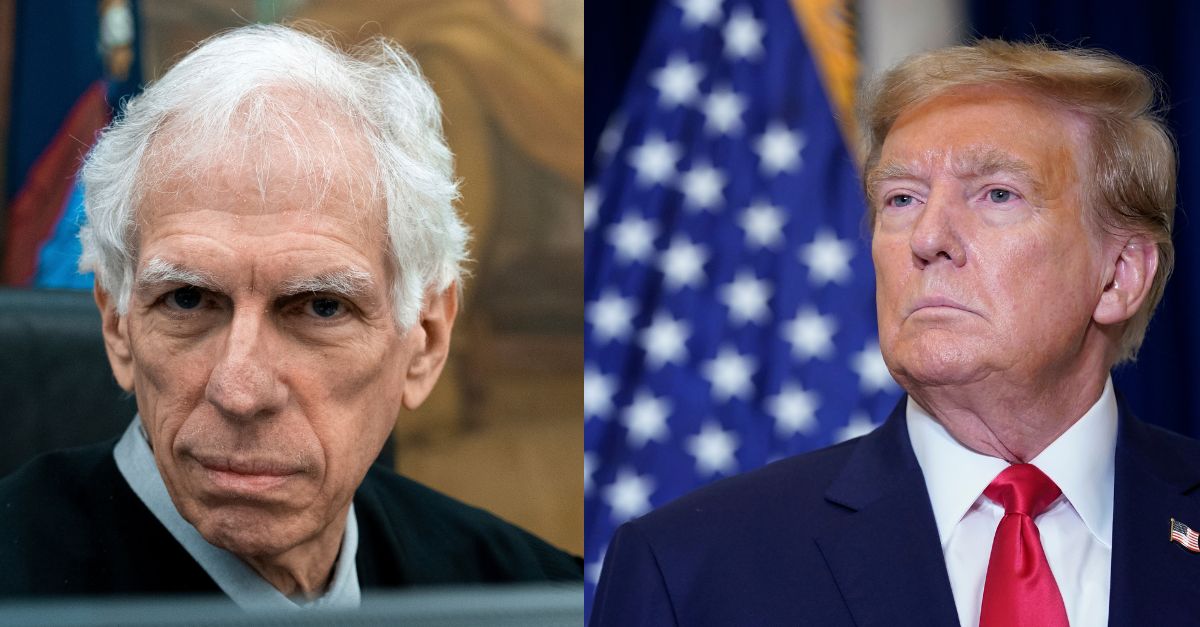
Left: Judge Arthur F. Engoron (Meir Chaimowitz/NurPhoto via AP). Right: Former President Donald Trump (AP Photo/Susan Walsh).
As attorneys for former President Donald Trump continue an appeal to overturn his massive $454 million civil fraud judgment in its entirety, the lawyers are still not done trying to get the bench trial judge off of the case.
Nearly a month after New York Supreme Court Justice Arthur Engoron declined to recuse himself from the case over complaints about a hallway chat with real estate lawyer Adam Leitman Bailey, an exchange that the judge described as an unremarkable yet annoying "nothingburger," attorneys for Trump on Thursday filed a notice that they are appealing to the Appellate Division, First Department, asking that court to find that Engoron erred on the law and "abused" his discretion by not stepping aside and by not ordering up an evidentiary hearing in front of a different judge "on the veracity" of Bailey's claims.
"This appeal is taken from each and every part of the Decision and Order on Motion insofar as Defendants are aggrieved," the notice said.
In a section of the filing outlining the issues upon appeal, the Trump team asked whether Engoron "committed errors of law and/or fact, abused its discretion, and/or acted in excess of its jurisdiction by, inter alia, denying Defendants' motion for the Court to recuse itself or, in the alternative, for an expedited evidentiary hearing before another judge."
In short, the appeal seems aimed at persuading the appellate court that there were ample grounds for Engoron to recuse himself or at least to have another judge look more closely at Bailey's claims and whether their conversation in any way influenced the case outcome.
On July 25, Engoron ripped Bailey for going on WNBC on Feb. 16, the day Trump and the Trump Organization were hit with the civil fraud judgment, telling the world that he had a conversation with the judge around three weeks before the decision.
"I actually had the ability to speak to him three weeks ago," Bailey said. "I saw him in the corner [at the courthouse] and I told my client, 'I need to go.' And I walked over and we started talking … I wanted him to know what I think and why … I really want him to get it right."
"He had a lot of questions, you know, about certain cases. We went over it," Bailey claimed, though he later said Trump's name wasn't mentioned.
Bailey's remarks prompted a court spokesman to say that the judge's decision was "his alone, was deeply considered, and was wholly uninfluenced by this individual," but Trump lawyers probed further — with limited success.
In the July denial that Trump is appealing, Engoron recalled Bailey "accosted me and started haranguing me about Executive Law § 63 (12)" after the judge got off of an elevator.
Writing that Bailey had been "a professional acquaintance and a distant friend," the judge said the "landlord-tenant lawyer" appeared suddenly in the hallway, was "ranting," and followed him out to his car.
"His sudden appearance and vehement speed took me aback, and I simply told him that he was wrong," Engoron said. "He trailed after me, still droning on, as I descended the Judge's stairs to the street level. I entered my vehicle without saying another word."
He called it outlandish and defamatory to suggest that this "nothingburger" and barely memorable 90-second episode had any role in the Trump decision.

"I did not initiate, welcome, encourage, engage in, or learn from, much less enjoy, Bailey's tirade," the order said. "I did not base any part of any of my rulings on it, as Bailey has outlandishly, mistakenly, and defamatorily claimed."
Comments